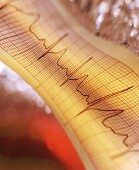- The Long-Term Effects of Daily Turmeric Supplements on Liver Health
- Could Your Grocery Store Meat Be Causing Recurring UTIs?
- Are You Making This Expensive Thermostat Error This Winter?
- Recognizing the Signs of Hypothyroidism
- 10 Strategies to Overcome Insomnia
- Could Artificial Sweeteners Be Aging the Brain Faster?
- Techniques for Soothing Your Nervous System
- Does the Water in Your House Smell Funny? Here’s Why
- Can a Daily Dose of Apple Cider Vinegar Actually Aid Weight Loss?
- 6 Health Beverages That Can Actually Spike Your Blood Sugar
Adults With Congenital Heart Trouble Need Follow-Up, Experts Say


The American Heart Association has issued its first-ever guidelines regarding life for patients older than 40 who were born with heart disease.
There are now more adults with congenital heart disease than children with the disease, Dr. Ami Bhatt, lead author of the recommendations, said in an AHA statement.
“These patients often have a sense that their heart has been ‘fixed’ and they don’t need follow-up,” said Bhatt, director of the Adult Congenital Heart Disease Program at Massachusetts General Hospital in Boston. “However, in adulthood they can develop complications from the underlying disease or the heart repairs that kept them alive as children. Therefore, these adults need lifelong cardiac care.”
According to the American Heart Association, adults with congenital heart disease can suffer from problems like heart failure, heart valve problems, high blood pressure (in the lungs) and heart rhythm problems due to their condition or as complications from treatment.
It’s also tough to predict which patients will encounter problems as they age. “A seemingly simple diagnosis from childhood can sometimes have complications in adulthood, while people with more complex congenital heart issues may stay stable with age,” Bhatt noted.
The association’s new recommendations include:
- People over 40 with congenital heart disease should exercise, although it’s common for them to have a certain level of intolerance of physical activity.
- Most of these people can be sexually active, although they should consult their doctor in certain situations, such as when they’re anxious about sexual activity or resuming it after a new problem or cardiac procedure.
- Erectile dysfunction drugs such as Viagra, Cialis or Levitra are fine for many men with congenital heart disease unless they’re taking nitrates or their condition requires them to abstain from sexual activity. As for women, vaginal estrogen therapy can help those with vaginal dryness.
- Women who are thinking about taking hormone replacement therapy to deal with symptoms like hot flashes during menopause should be aware of a higher risk of blood clots during some cardiac procedures.
- People should be monitored by a cardiologist and and keep records of their childhood diagnoses and treatments.
“Patients should be proactive to ensure that their providers are well-versed in their disease and should respectfully encourage their providers to seek expert consultation if they are not,” Bhatt said.
The guidelines are published April 20 in the journal Circulation.
More information
For more about congenital heart disease, try the American Heart Association.
Source: HealthDay
Copyright © 2026 HealthDay. All rights reserved.










